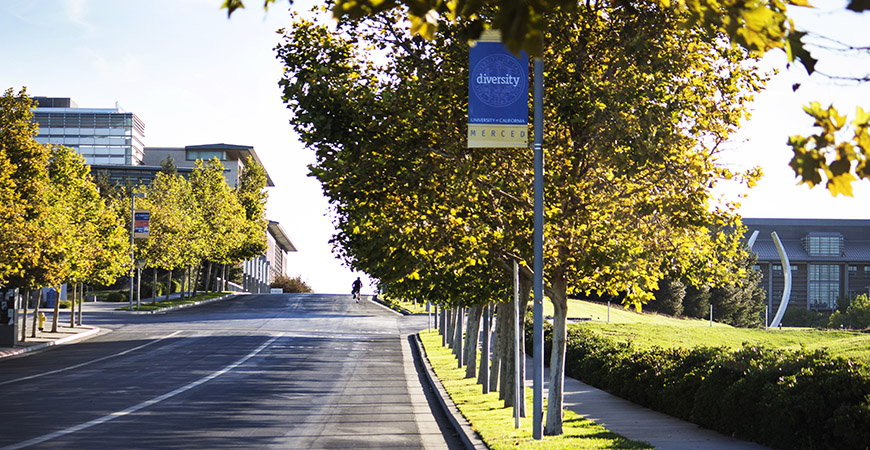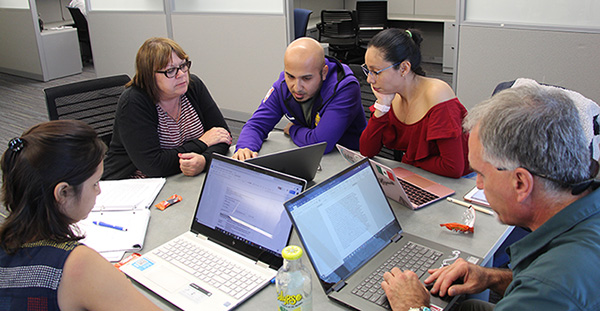
It has been two years since UC Merced received the $280,000 Henry Luce Foundation grant, but its community engaged research endeavors are far from over.
This fall, UC Merced Interdisciplinary Humanities graduate students and faculty will have the benefit of two additional years of funding to find new opportunities to grow intersections of humanities research and community engagement in Merced.
Founded in 1936 by Henry R. Luce, who created Time magazine, the Luce Foundation is a nonprofit committed to transforming humanities doctoral education and to strengthening the ties between researchers and the public. It has supported hundreds of organizations with more than 5,800 grants worth more than $1 billion.
“The Luce Foundation has a history of supporting public knowledge and making scholarship accessible. It was really interesting that the foundation connected with Merced — a rural area in the West — and saw similar potential for community engaged work,” said Teaching Professor Anne Zanzucchi, co-principal investigator of the Luce project.
When asked about the new partnership in 2019, Henry Luce Foundation Vice President Sean Buffington told UC Merced “The character of the university; its relative smallness within the UC system; its location in a part of California that is not well-served by the UC system; its close connection to the city of Merced and community organizations — all of that creates a really interesting environment within which to pursue a project like this.”
In the past two years, fellows have each received $7,000 to further their research with local community partners and demonstrate how humanities research can influence local and national discourse on key issues. Working either in groups or alone, Interdisciplinary Humanities graduate students have conducted research from topics such as water governance and power in the San Joaquin Valley to mapping downtown Merced’s history through digitizing archives, creating oral histories and analyzing urban spaces. In the process the graduate students gain new skills that prepare them for academic and other career paths.
This year, the UC Merced team has renewed and expanded its relationship with the Luce Foundation with the goal of including even more collaboration between Interdisciplinary Humanities faculty and students. More events are on the agenda as well, a recent Sept. 11 symposium featured Imagining America’s Faculty Director Erica Kohl-Arenas and five of its PAGE (Publicly Active Graduate Education) fellows to link UC Merced to a national conversation.

“Community-engaged research is a national movement,” said co-Principal Investigator Professor Robin DeLugan. “This work opens up the imaginations and the horizons for our Ph.D. students to go beyond traditional career paths. It makes them more marketable, too.”
DeLugan said the hope of the program in the next two years is to continue building strong relationships and support for community partners. The co-directors have emphasized internship opportunities, too.
Interdisciplinary Humanities Ph.D. candidate and current Luce Fellow Joshua Semerjian has worked in partnership with local nonprofit We‘Ced Youth Media, a project of the Youth Leadership Institute. Semerjian’s research focuses on the relationship between home life, public experiences and extracurriculuar involvement in local change movements.
“It’s media production based, but it’s also for youth who are looking for connections with other youth in ways that support the whole person,” Semerjian said. “It’s not just about learning skills in media and journalism, it is also learning how to be a voice for yourself and for other communities that you have an interest in learning more about or are involved in.”
Historically, a lot of the work that has been done with We’Ced Youth Media has been personal narrative, poetry, art and photography. The We’Ced youth reporters have honed their media skills by working to give a voice to those who may not feel heard. The youth post on social media, organize community events and work to create a more global picture of Merced.
Semerjian’s research and participation with the Youth Leadership Institute dovetails nicely with the Henry Luce Foundation’s mission of merging humanities scholarship and community.
“University research can present itself as inaccessible to people outside of the community, but it’s not insular or isolated from what’s happening in the community and this is a way of looking at what problems there are and how scholarship can work to look at those problems,” Semerjian said. “It’s fitting because this foundation has a commitment to putting knowledge in the hands of communities. Community engagement is about knowledge production through the thoughts and feelings of the people who need access to the knowledge that’s being produced.”
More projects are on the horizon in the next two years, to benefit both UC Merced’s scholarship mission and the growth of the Merced community.
“We can’t wait to see what else we conjure up,” DeLugan said.






